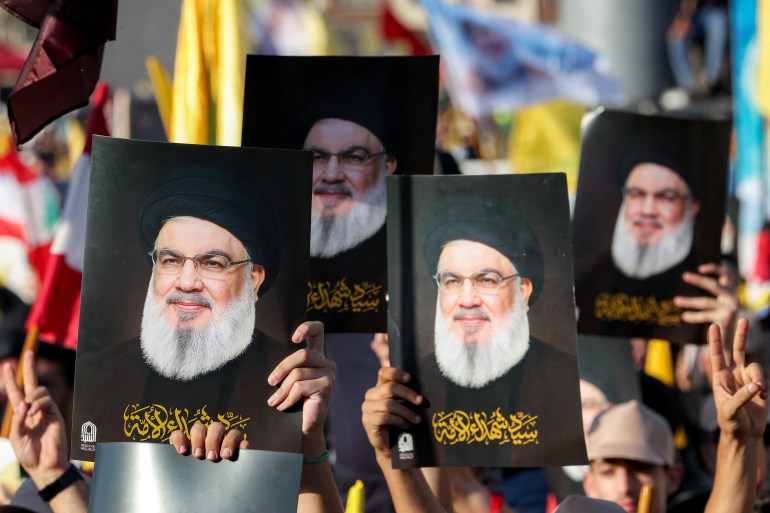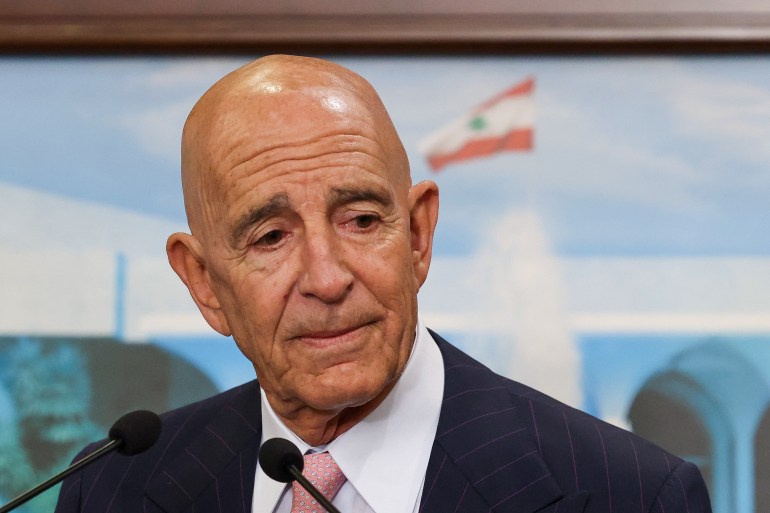Cyber Security News Aggregator
.Cyber Tzar
provide acyber security risk management
platform; including automated penetration tests and risk assesments culminating in a "cyber risk score" out of 1,000, just like a credit score.After Israel War, How Is Hezbollah Rebuilding in Lebanon?
published on 2025-09-28 15:23:30 UTC by Snutz37Content:
One year after Israel carried out the killing of Hassan Nasrallah, it is reported that Hezbollah, the Lebanese organization he headed, is rebuilding.
Experts think that although a weakened Hezbollah is no longer a major threat to Israel, it can still cause disorder and test rivals within the country as it works to establish a political position to maintain its influence.
Regarded for a long time as the most powerful nonstate military group in the area, Hezbollah has seen its influence decline over the past year, leading to global and local efforts demanding its complete disbandment.
If managed carelessly, experts suggest, the pressure to disband the group might cause it to retaliate, resulting in internal conflicts that could surpass efforts made by international and regional entities.
Hezbollah’s statements continue to show resistance, and it has vowed to oppose the Lebanese government’s attempts to disband it – as its current leader, Naim Qassem, emphasized on Saturday to a large group of people who had assembled at Nasrallah’s tomb to honor his killing.
We will never give up our arms, nor will we let them go,” he stated to the audience, emphasizing that Hezbollah would keep “challenging any initiative that benefits Israel.
No action yet
Hezbollah began exchanging attacks with Israel on October 8, 2023, the day following Israel’s initiation of its campaign in Gaza. This conflict persisted until September 2024, when increased Israeli military activity and a subsequent invasion resulted in approximately 4,000 deaths in Lebanon, thousands of injuries, and the displacement of hundreds of thousands of people.
On November 27, when a ceasefire was declared, a significant portion of Hezbollah’s top military leadership, including Nasrallah, the group’s secretary-general, had already been killed by Israel.
The ceasefire terms were vaguely outlined, as reported by diplomatic sources familiar with the deal, but the general perception was that both parties would stop attacking, Hezbollah would disband in southern Lebanon, and Israel would pull its troops out of the south. However, soon after, Israel and the United States claimed that Hezbollah needed to completely disarm.
Observing its decline, adversaries of Hezbollah both within the country and in the region started urging the group to surrender its arms. Perceiving the shifting regional dynamics, several of Hezbollah’s local allies abandoned their stance and expressed backing for complete disarmament.
The Lebanese administration, facing pressure from the United States and Israel, declared on September 5 that the Lebanese military has been assigned the responsibility of developing a strategy to disarm Hezbollah.
Meanwhile, Israel has consistently breached the ceasefire, carrying out bombings in southern Lebanon. UNIFIL, the United Nations peacekeeping mission in the region, stated that Israel is engaging in “ongoing violations of this [ceasefire] agreement, including air and drone attacks on Lebanese soil.”
Although there has been media speculation suggesting that Hezbollah is reorganizing in southern Lebanon, especially in anti-Hezbollah media sources, the group has only attributed one attack to itself since the ceasefire was declared in November.
Experts think Hezbollah is no longer able to pose a threat to Israel, indicating that if Israel chooses to increase its attacks in Lebanon, it will be due to reasons unrelated to Hezbollah’s present abilities.
Hezbollah and its allies claim that Israel’s ongoing threats, breaches of agreements, and continued occupation of five locations within Lebanese territory provide a rationale for maintaining resistance.
“A persistent real threat supports the need to keep deterrence and defense systems in place, as deterrence is not a single occurrence but an ongoing process that demands a consistent and unified power structure within a larger political framework,” wrote Ali Haidar, a writer for the pro-Hezbollah newspaper Al-Akhbar, recently.
Al Jazeera contacted Hezbollah for a statement but had no reply prior to the release.
What does ‘regrouping’ mean?
“Neither military nor political forces will reorganize after experiencing a significant loss, as [Hezbollah] did last year,” said Michael Young, a Lebanese analyst and writer.
But are they capable of launching rockets and bombing northern Israel near the border? No. Are they able to fire missiles at towns and cities? No.
So what is [regrouping]?
A Lebanese political scientist named Imad Salamey stated to Al Jazeera, “Hezbollah has been greatly weakened – there has been loss of leadership, [interception] of communications, and damage to command and control structures. They will attempt to bounce back, but it’s likely they will become a smaller, less expensive, and more flexible Hezbollah.”
“Israeli evaluations also highlight the destruction that has occurred and Hezbollah’s efforts to rebuild through smuggling and self-production despite strong intelligence monitoring, indicating that any recovery will be limited and temporary rather than significant in the short term,” Salamey added.
In early December, the government led by Bashar al-Assad, an ally of Hezbollah, fell in Syria, dealing another setback to the group, as it severed a direct land corridor for arms and funding to reach the group from Iran.
Meanwhile, analysts noted that Hezbollah has been attempting to utilize its remaining influence through diplomatic efforts, including sending messages to long-standing adversaries such as Saudi Arabia.
“We guarantee that the resistance’s weapons are directed against the Israeli adversary, not Lebanon, Saudi Arabia, or any other location or organization globally,” Qassem stated in a speech on September 19.
The communication directed at Saudi Arabia, which has previously supported groups opposing Hezbollah in Lebanon, marks a change in the organization’s approach, according to analysts.
There’s a suggestion that they believe they can handle matters politically,” Young stated. “They might think they don’t have to use force or weapons if they can gain more from the system.
It also mirrors the emerging political landscape in Lebanon and the broader region, where Israel and the United States have gained strength, while Iran, Hezbollah’s key ally, has experienced a decline.
“Hezbollah is beginning to understand that it is caught,” said Lebanese political analyst Karim Emile Bitar to Al Jazeera.
Prior to the conflict, Hezbollah had the power to influence or determine government outcomes. However, President Joseph Aoun and Prime Minister Nawaf Salam were chosen in early 2025 even though neither was the candidate favored by Hezbollah.
Nevertheless, Hezbollah was either unwilling or incapable of hindering the establishment of Salam’s government. Experts noted that the group urgently requires foreign assistance that the government might obtain to aid in reconstructing its bases harmed by Israeli strikes.
However, the funds have not been received yet due to ongoing regional and domestic discussions about whether the government should obtain reconstruction money prior to Hezbollah’s disbandment and other banking or political changes.
Analysts and diplomats reported to Al Jazeera that Hezbollah remains able to escalate tensions but has refrained from provoking further conflict because of the increasing backing from the Lebanese government, along with the exhaustion and emotional strain experienced by Hezbollah members and their supporters following last year’s war and ongoing Israeli attacks on Lebanon.
Nevertheless, on Thursday, followers of Hezbollah gathered along Beirut’s coast to honor Nasrallah. Supporters displayed their late leader’s image on the Raouche Rocks, disregarding directives from the prime minister’s office that prohibited this action.
The gathering was viewed by Nasrallah’s followers as a demonstration of affection and by Hezbollah’s adversaries as an offensive act. However, the organization, which has previously used aggression to achieve its goals, has mostly refrained from inciting tensions since the conflict, with only sporadic efforts to obstruct roads that were promptly cleared by the Lebanese armed forces.
If Hezbollah is working on reorganizing militarily, a high-ranking Western official familiar with the matter stated, it would be more probable in the Bekaa Valley rather than the south, where the ceasefire agreement has largely been successful in overseeing Hezbollah’s retreat.
However, the group does seem to be changing its political approach, Young stated, noting that Hezbollah, under guidance from Iran, might eventually seek specific compromises.
He highlighted suggestions made by parliament members Ali Hassan Khalil, an ally of Hezbollah, and Ali Fayyad, a Hezbollah representative, within their subcommittees, where they discussed the implementation of the 1989 Ta’ef Accord, an agreement that concluded the civil war, stated that all militias must surrender their weapons, and called for Lebanon to move toward a nonsectarian governance system.
Their underlying argument is that ‘If we fully implement Ta’ef, it could provide us with a more significant role and improved representation, and then we can discuss weapons,’ Young stated.

Is it time for Hezbollah to leave?
Under growing pressure to disband Hezbollah, experts and officials worry that excessive force might provoke the group’s retaliation.
The United States has unveiled a $14.2 million assistance program for the Lebanese armed forces aimed at supporting efforts to neutralize Hezbollah. Meanwhile, increased visits from American officials—such as Republican Senator Lindsey Graham, deputy special envoy Morgan Ortagus, and special envoy Tom Barrack—have escalated the pressure on Lebanon.
“It’s time for Hezbollah to leave,” Graham stated during his visit in late August.
However, Lebanon’s military has refused to establish a rigid schedule for Hezbollah’s disbandment due to concerns that the volatile situation in Lebanon might escalate into conflict.

Reports of U.S. assistance have been met with negative reactions in certain areas of Lebanon, where it is perceived as part of an American strategy to leverage Lebanon’s armed forces to advance Israeli objectives.
“[The Lebanese army] will never act as a border guard for Israel. Its arms are not tools of conflict, and its purpose is holy: to defend Lebanon and its citizens,” stated Parliament Speaker Nabih Berri, an ally of Hezbollah, in a statement on Tuesday.
The concerns of diplomats and experts are that a clash between the military and Hezbollah might result in domestic conflict and a possible division of the army based on religious affiliations—much like occurred during the initial phase of the 1975-1990 Lebanese Civil War.
“Disarming Hezbollah through force is the worst possible approach, but it’s clearly how the Americans are increasingly urging the Lebanese government to address this issue,” Young said to Al Jazeera.
The Lebanese military is unwilling to address it using force, as they do not wish to be drawn into a conflict with Hezbollah.
The post After Israel War, How Is Hezbollah Rebuilding in Lebanon? appeared first on FondTimes.
https://fondtimes.com/2025/09/28/after-israel-war-how-is-hezbollah-rebuilding-in-lebanon/
Published: 2025 09 28 15:23:30
Received: 2025 09 29 03:42:06
Feed: CyberPunk
Source: CyberPunk
Category: Cyber Security
Topic: Cyber Security
Views: 14
